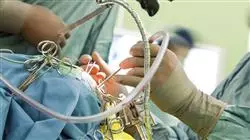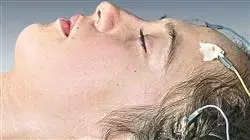University certificate
Scientific endorser

The world's largest faculty of medicine”
Introduction to the Program
Aimed at professionals in the field of pediatrics who seek to improve the skills necessary to produce an adequate diagnostic strategy together with a correct treatment approach"

In recent years we have witnessed a considerable increase in the demand for neuropediatric care, which can be justified for several reasons.
On the one hand, the continuous advances in neurosciences have led to the discovery and diagnosis of previously unknown neurological diseases. This has led to the death of children or the development of severe sequelae.
On the other hand, the appearance of social changes and advances have led to new care demands that had been previously underdeveloped. The rise of assisted reproduction and the improvement of neonatal care techniques lead to a higher rate of multiple and premature births with increased survival rates. This leads to increased morbidity and the need for more specialized care at both the health and educational levels.
General pediatricians cannot encompass the complexity of all pediatric subspecialties. As they progress in their development, each one of them acquires a specific body and entity to become its own specialty. In addition, the particularities of child development and its variability according to age and other factors do not allow neurologists for adults to cope with the existing demand.
All this, together with the great diversity and complexity of neurological disorders in childhood, means that more and more neuropediatric units are needed and the demand for highly trained professionals in this area is increasing.
The weight of neuropediatrics within general pediatrics almost exceeds 25% of the overall demand in specialized care units in our country. This figure, together with the significant increase in overall pediatric demand and despite the current birth rate, suggests a significant increase in the coming years.
More and more authors are reporting an increase in the diagnosis of various neurological pathologies typical of childhood, such as disorders within the autism spectrum, learning disabilities, and even neoplasms affecting the central nervous system. This is leading to the development of units structured on the basis of care processes oriented towards specific pathologies and therefore to a need for extremely high need specialization.
Update your knowledge with the Professional master’s degree in Pediatric Neurology and Neurodevelopment"
This Professional master’s degree in Pediatric Neurology and Neurodevelopment contains the most complete and up-to-date scientific program on the market. The most important features include:
- The graphic, schematic, and practical contents with which they are created provide scientific and practical information on the disciplines that are essential for professional practice
- Diagnostic-therapeutic developments on assessment, diagnosis, and treatment in pediatric neurology and neurodevelopment
- It contains practical exercises where the self-evaluation process can be carried out to improve learning
- Iconography of clinical and diagnostic imaging tests
- An algorithm-based interactive learning system for decision-making in the clinical situations presented throughout the course
- With special emphasis on evidence-based medicine and research methodologies in pediatric neurology and neurodevelopmental neurology
- All of this will be complemented by theoretical lessons, questions to the expert, debate forums on controversial topics, and individual reflection assignments
- Content that is accessible from any fixed or portable device with an Internet connection
This Professional master’s degree may be the best investment you can make when selecting a refresher program, for two reasons: in addition to updating your knowledge of Pediatric Neurology and Neurodevelopment, you will obtain a qualification from Pediatric Neurology and Neurodevelopment”
The teaching staff includes professionals from the field of Pediatric Neurology and Neurodevelopment, who bring their experience to this program, as well as renowned specialists from leading scientific communities.
Thanks to its multimedia content developed with the latest educational technology, it will allow the professional a situated and contextual learning, that is to say, a simulated environment that will provide an immersive learning programmed to prepare in real situations.
The design of this program is based on Problem-Based Learning, through which the physician must try to solve the different professional practice situations that arise throughout the academic course. For this purpose, the physician will be assisted by an innovative, interactive video system created by renowned and experienced experts in the field of Pediatric Neurology and Neurodevelopment with extensive teaching experience.
This Professional master’s degree offers education in simulated environments, which provides an immersive learning experience designed to prepare for real-life situations"

It includes clinical cases to bring the program as close as possible to the reality of medical care"
Why study at TECH?
TECH is the world’s largest online university. With an impressive catalog of more than 14,000 university programs available in 11 languages, it is positioned as a leader in employability, with a 99% job placement rate. In addition, it relies on an enormous faculty of more than 6,000 professors of the highest international renown.

Study at the world's largest online university and guarantee your professional success. The future starts at TECH”
The world’s best online university according to FORBES
The prestigious Forbes magazine, specialized in business and finance, has highlighted TECH as “the world's best online university” This is what they have recently stated in an article in their digital edition in which they echo the success story of this institution, “thanks to the academic offer it provides, the selection of its teaching staff, and an innovative learning method aimed at educating the professionals of the future”
A revolutionary study method, a cutting-edge faculty and a practical focus: the key to TECH's success.
The most complete study plans on the university scene
TECH offers the most complete study plans on the university scene, with syllabuses that cover fundamental concepts and, at the same time, the main scientific advances in their specific scientific areas. In addition, these programs are continuously being updated to guarantee students the academic vanguard and the most in-demand professional skills. In this way, the university's qualifications provide its graduates with a significant advantage to propel their careers to success.
TECH offers the most comprehensive and intensive study plans on the current university scene.
A world-class teaching staff
TECH's teaching staff is made up of more than 6,000 professors with the highest international recognition. Professors, researchers and top executives of multinational companies, including Isaiah Covington, performance coach of the Boston Celtics; Magda Romanska, principal investigator at Harvard MetaLAB; Ignacio Wistumba, chairman of the department of translational molecular pathology at MD Anderson Cancer Center; and D.W. Pine, creative director of TIME magazine, among others.
Internationally renowned experts, specialized in different branches of Health, Technology, Communication and Business, form part of the TECH faculty.
A unique learning method
TECH is the first university to use Relearning in all its programs. It is the best online learning methodology, accredited with international teaching quality certifications, provided by prestigious educational agencies. In addition, this disruptive educational model is complemented with the “Case Method”, thereby setting up a unique online teaching strategy. Innovative teaching resources are also implemented, including detailed videos, infographics and interactive summaries.
TECH combines Relearning and the Case Method in all its university programs to guarantee excellent theoretical and practical learning, studying whenever and wherever you want.
The world's largest online university
TECH is the world’s largest online university. We are the largest educational institution, with the best and widest online educational catalog, one hundred percent online and covering the vast majority of areas of knowledge. We offer a large selection of our own degrees and accredited online undergraduate and postgraduate degrees. In total, more than 14,000 university degrees, in eleven different languages, make us the largest educational largest in the world.
TECH has the world's most extensive catalog of academic and official programs, available in more than 11 languages.
Google Premier Partner
The American technology giant has awarded TECH the Google Google Premier Partner badge. This award, which is only available to 3% of the world's companies, highlights the efficient, flexible and tailored experience that this university provides to students. The recognition as a Google Premier Partner not only accredits the maximum rigor, performance and investment in TECH's digital infrastructures, but also places this university as one of the world's leading technology companies.
Google has positioned TECH in the top 3% of the world's most important technology companies by awarding it its Google Premier Partner badge.
The official online university of the NBA
TECH is the official online university of the NBA. Thanks to our agreement with the biggest league in basketball, we offer our students exclusive university programs, as well as a wide variety of educational resources focused on the business of the league and other areas of the sports industry. Each program is made up of a uniquely designed syllabus and features exceptional guest hosts: professionals with a distinguished sports background who will offer their expertise on the most relevant topics.
TECH has been selected by the NBA, the world's top basketball league, as its official online university.
The top-rated university by its students
Students have positioned TECH as the world's top-rated university on the main review websites, with a highest rating of 4.9 out of 5, obtained from more than 1,000 reviews. These results consolidate TECH as the benchmark university institution at an international level, reflecting the excellence and positive impact of its educational model.” reflecting the excellence and positive impact of its educational model.”
TECH is the world’s top-rated university by its students.
Leaders in employability
TECH has managed to become the leading university in employability. 99% of its students obtain jobs in the academic field they have studied, within one year of completing any of the university's programs. A similar number achieve immediate career enhancement. All this thanks to a study methodology that bases its effectiveness on the acquisition of practical skills, which are absolutely necessary for professional development.
99% of TECH graduates find a job within a year of completing their studies.
Professional Master's Degree in Pediatric Neurology and Neurodevelopment
The scientific development of recent years has led the neurological field to a new level of progress, in this scenario professionals find an optimal opportunity for professional expansion. From TECH Global University we understand the importance of this discipline, so we designed the Master's Degree in Pediatric Neurology and Neurodevelopment with the aim of providing an excellent opportunity for academic qualification. Our program has a state-of-the-art multimedia teaching system, an updated document bank and an interactive learning system based on algorithms to improve decision-making in clinical situations.
Postgraduate course in neuropediatrics 100% online
Our postgraduate degree in neuropediatrics has been designed by the best specialists in this field of medicine, thanks to this, students have the possibility of accessing an innovative study plan, which will allow them to obtain the necessary knowledge in the following topics: advances in infectious diseases, prenatal neurology, malformations, inborn errors in metabolism, among other contents of great academic value. In addition, upon completion of the master's degree, professionals will have an optimal conceptual background that will allow them to implement work strategies based on the comprehensive approach to the patient, knowing in depth the characteristics and needs of the affected individual.







